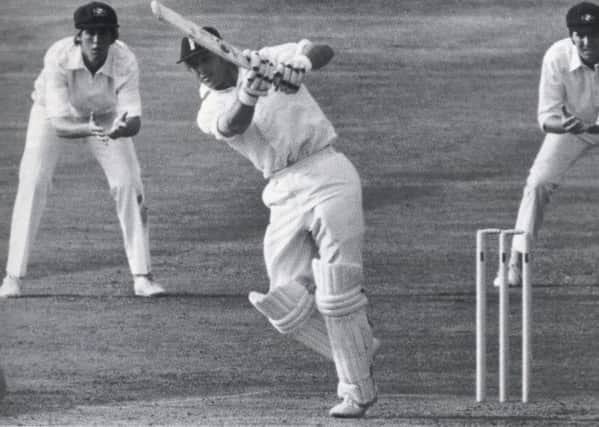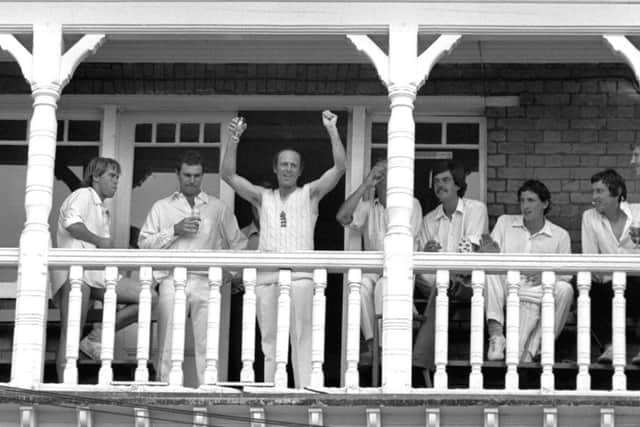Weekend Interview (video): Geoffrey Boycott's 100th hundred '“ '˜The greatest moment of my career'


“When the Yorkshire public came, they all just assumed and presumed that I’d do it.
“For me, that was the greatest compliment.
“They’d seen me get so many hundreds and play so many innings for Yorkshire, that they thought it was automatic.”
Advertisement
Hide AdAdvertisement
Hide Ad

Boycott was reflecting on his 100th hundred in the Headingley Ashes Test of 1977.
It is one of many topics that will be discussed by the former Yorkshire and England batsman during an evening at the Leeds ground on October 5 to celebrate his career (see accompanying panel).
On the face of it, one evening is hardly enough to do justice to one of the most incredible careers that the game has seen.
But Boycott will have a good go and insists that if he had to pick one moment, one favourite memory from more than half-a-century involved in the sport, it would be that historic 100th hundred.
Advertisement
Hide AdAdvertisement
Hide Ad

“That’s the one I’ll always be most remembered for,” he says.
“Considering the pressure and everything, and all the expectation around it, that’s the thing that stands out.
“Seventeen guys had got 100 hundreds before me, but I was the first one to do it in a Test match.
“I didn’t think the odds were too good – if many of the great players before me hadn’t done it, so much greater than me – then you think, ‘Oh no, this is a bit tough’.”
Advertisement
Hide AdAdvertisement
Hide AdOne man who did not share Boycott’s anxiety was Arnie Sidebottom.
Like the Yorkshire public who flocked to Headingley on August 11, 1977, enough to have filled the ground 100 times over if everyone who claims to have been there was actually present, Sidebottom had absolute faith in his county team-mate.
“Arnie made a bet wherever Yorkshire were playing,” laughs Boycott.
“He put a tenner on, or something, at about 8-1.
“I thought he must have been crazy. He said it was the easiest money he made in his life.”
Advertisement
Hide AdAdvertisement
Hide AdBoycott had scored his 99th hundred in Yorkshire’s previous Championship match against Warwickshire at Edgbaston.
It followed his 98th century against Australia at Trent Bridge, where he returned to Test cricket after a self-imposed exile.
“I felt the pressure even more (going into Headingley) because I thought that my 98th hundred at Nottingham was probably the best innings of character I ever played in my life,” he says.
“It was my comeback Test, and there were people who were not cheering for me because I wouldn’t play for three years. There were always going to be people thinking, ‘Has he got it? Has he lost it?’
Advertisement
Hide AdAdvertisement
Hide Ad“When I came back, I was 36-and-a-half, and many of the great players in recent times have retired by then.
“I knew I was going to get a barrage of short-pitched bowling from (Jeff) Thomson and (Len) Pascoe. I knew what I was letting myself in for.
“But I got through Nottingham, even after running out (Derek) Randall, the local hero and a good friend of mine. Then I got a hundred against Warwickshire in a rain-ruined match.
“When I rang Rachael (now his wife) after the Warwickshire game, she said, ‘You’ve done it now.’
“I said, ‘Done what?’
Advertisement
Hide AdAdvertisement
Hide Ad“She said: ‘You’re on for your 100th hundred at Headingley.’
“I thought: ‘Oh no.’ I’d just got through all the stress of coming back into Test cricket, and now I had to do it all over again.”
To say that Boycott was nervous is an understatement.
When he arrived at Headingley in the build-up to the match, there were sacks of mail wishing him well.
“I didn’t sleep before the game,” he recalls. “I was up at 4 in the morning, hot in the hotel room, asking the porter to sort out the air con. Normally, I was a very good sleeper and always got eight hours.”
Advertisement
Hide AdAdvertisement
Hide AdTired and stressed, Boycott arrived late at the ground on the first day. “I was late for nets, and I was never late,” he says. “By the time I parked my car and got changed, Keith Boyce, the groundsman, was taking the nets down.
“I thought: ‘Bloody hell, I haven’t even had a knock-up.’ I said I just needed to have a few minutes, and luckily I managed to have a little hit before I went in.”
England won the toss, and Mike Brearley was caught behind off the third delivery.
Boycott felt “nervous as hell” until about half-an-hour in, whereupon he started to play with trademark assurance.
Advertisement
Hide AdAdvertisement
Hide Ad“For me, it was all about rhythm, about footwork,” he says. “It’s like the great dancers; if your feet go in good positions, and the balance and weight of your body is right, it’s easier for the bat to come down in the right place.
“After half-an-hour or so, I felt fine, and I actually felt better the more I went on.
“I always thought that the more difficult period was when you were on nought and getting to 20; I was never nervous in the 90s or anything like that.”
After more than five hours of fierce concentration, Boycott had moved to within one hit of fulfilling his destiny.
Advertisement
Hide AdAdvertisement
Hide AdGreg Chappell, the Australia captain, was bowling from the Rugby Stand end.
“I was telling myself that there were three safe areas to hit him: extra cover, off my legs and straight,” says Boycott. “I thought: ‘Don’t hook, don’t do anything silly, just wait’.”
Sure enough, Chappell served up a ball which Boycott stroked to the mid-on boundary.
He threw his arms aloft before it crossed the rope.
“As soon as the ball left his hand, I knew that I was going to hit it, and I knew exactly where I was going to hit it,” he says. “It was a fantastic feeling, because you’re almost in total control.
Advertisement
Hide AdAdvertisement
Hide Ad“Roopey (Graham Roope, the non-striker) had to jump out of the way of the ball.
“He always said to me: ‘What would have happened if I hadn’t have jumped out of the way and you’d have got out next ball without getting a hundred?’
“I said: ‘The Yorkshire public would have strung you up’.”
Hundreds of people invaded the ground to acclaim the local hero.
After seven or eight minutes, order was restored, and England went on to win the match and the Ashes.
Advertisement
Hide AdAdvertisement
Hide Ad“In the space of three weeks, I’d gone from coming back into Test cricket, with everything that was hanging over me, to getting my 100th hundred,” says Boycott.
“I’d gone through all that to such a magical moment.
“I always say that Trent Bridge was my finest century.
“But that 100th hundred was the greatest moment of my cricketing career.”